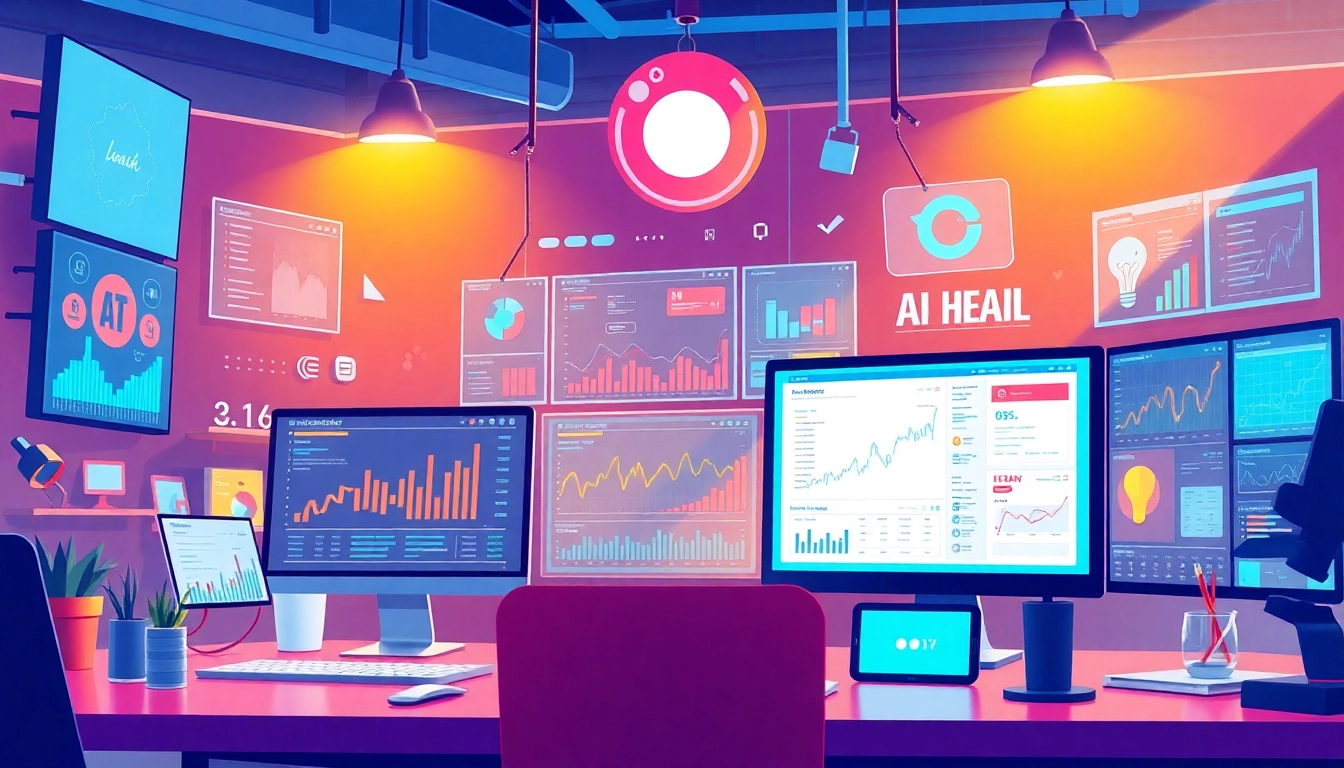Understanding AI Marketing Tools
Definition and Importance
AI marketing tools represent a revolutionary approach in the marketing landscape, marrying advanced algorithms and artificial intelligence technologies with traditional marketing practices. These tools are designed to analyze data, predict consumer behavior, and optimize marketing strategies in real time. As businesses strive to remain competitive and relevant in a fast-paced digital economy, leveraging AI marketing tools has become increasingly vital. They facilitate personalized customer experiences, enhance decision-making processes, and drive better return on investment (ROI).
Key Benefits of Using AI
The implementation of AI marketing tools comes with a myriad of benefits:
- Enhanced Data Analysis: AI can process vast amounts of data far more efficiently than humans, yielding insights that can guide marketing decisions.
- Personalization: AI enables marketers to create highly personalized content and experiences that resonate with individual customer preferences.
- Efficiency Improvement: Automating repetitive tasks, such as customer segmentation and campaign optimization, allows marketing teams to focus on strategic initiatives.
- Cost-Effectiveness: These tools can optimize ad spend, helping organizations achieve better results without significantly increasing budgets.
- Predictive Insights: AI can forecast trends and customer behavior, allowing businesses to anticipate market changes and adapt quickly.
Common Misconceptions
Despite the advantages of AI marketing tools, several misconceptions persist:
- Only Large Companies Benefit: Many believe that AI tools are tailored only for large organizations due to resource constraints. However, numerous affordable options cater to small and medium enterprises.
- AI Replaces Human Jobs: While AI automates some tasks, it is designed to assist rather than replace human marketers, allowing them to focus on creative and strategic thinking.
- AI is Overly Complex: Many tools come with user-friendly interfaces that simplify data analytics and campaign management, making them accessible even to those without technical expertise.
Top AI Marketing Tools to Consider
Content Creation Tools
Content is king in marketing, and AI-driven content creation tools have transformed how companies generate and distribute material.
- Jasper: Known for its ability to generate high-quality content, Jasper utilizes natural language processing to create blog posts, social media captions, and marketing copy.
- Copy.ai: This tool specializes in generating copy for various formats, making it easier for marketers to maintain consistent messaging across channels.
- Surfer SEO: Surfer assesses existing content against SEO best practices, helping marketers optimize for better visibility on search engines.
Social Media Management Solutions
Managing social media at scale can be overwhelming without the right tools. AI-driven platforms streamline this process.
- Buffer: Buffer provides AI insights on the best times to post, optimal content formats, and audience engagement metrics.
- FeedHive: This tool automates content recycling and manages posting schedules, freeing marketers to focus on creativity and strategy.
- Hootsuite: Comprehensive social media management combining scheduling, analytics, and engagement monitoring powered by AI.
Email and Automation Platforms
Email marketing remains a pivotal strategy in any marketing mix. AI-enhanced tools can greatly improve effectiveness.
- Mailchimp: Incorporates AI to segment audiences based on behavior and optimize email send times, significantly boosting open rates.
- HubSpot: Offers marketing automation tools that utilize AI for predictive lead scoring and personalized email campaigns.
- Sendinblue: This platform uses machine learning algorithms to optimize deliverability rates and manage automated workflows seamlessly.
How to Choose the Right AI Marketing Tool
Assess Your Business Needs
The first step in selecting an AI marketing tool is to understand your specific business requirements. Consider the following questions:
- What marketing objectives are you aiming to achieve?
- Which areas of your marketing strategy could benefit from AI assistance?
- What is your budget for new marketing tools?
Evaluate Tool Features
Once you’ve determined your needs, assess the features of various tools. Look for:
- User-friendliness and integration capabilities with existing systems
- Customizability to fit your specific marketing goals
- Support options and community resources for troubleshooting and learning
- Analytics and reporting features to measure effectiveness and ROI
Cost vs. Benefit Analysis
Before finalizing a tool, conduct a thorough cost-benefit analysis to ensure the investment is justified. Evaluate:
- Subscription costs against predicted returns from improved efficiency and results.
- Potential revenue increases from better-targeted campaigns.
- Time saved through automation versus the investment of your team’s time in learning the new system.
Implementing AI Marketing Tools Effectively
Integrating with Existing Systems
Smooth integration of new AI tools with your existing marketing ecosystem is crucial for maximizing their benefits. Consider these best practices:
- Assess compatibility with current software and platforms to avoid disruptions.
- Plan for a phased implementation, starting with a pilot project before full-scale rollout.
- Utilize APIs where available for seamless data transfer and tool communication.
Staff Training and Onboarding
Equipping your team with the necessary skills to use AI marketing tools effectively is vital:
- Provide comprehensive training sessions focusing on the tool’s functionalities and best practices.
- Encourage ongoing learning through webinars, tutorials, and user group involvement.
- Monitor progress and offer additional support as needed, helping staff adapt comfortably to changes.
Monitoring and Adjusting Usage
Continuous monitoring is essential to ensure the tools meet business goals. Regularly evaluate the following:
- Performance metrics, including engagement rates, conversion rates, and campaign performance.
- User feedback from team members to identify areas for improvement or difficulties.
- Return on Investment (ROI) to validate the effectiveness of the tools being used.
Future Trends in AI Marketing
Emerging Technologies
The landscape of AI in marketing is continuously evolving. Some of the exciting trends to watch include:
- Voice Search Optimization: With more consumers using voice-activated devices, AI tools will increasingly accommodate voice search in marketing strategies.
- AI-Powered Chatbots: These tools will become more sophisticated, offering personalized customer service and support, thus improving user experience.
- Augmented Reality Marketing: AI will play a crucial role in integrating AR into marketing campaigns, enhancing customer interaction and engagement.
Predictions for Marketing Innovation
Experts predict that as AI technology advances, its applications in marketing will deepen, unlocking new methods for customer engagement:
- Hyper-personalization based on real-time data analysis and behavioral insights.
- AI-driven creative processes that could potentially craft campaigns without human intervention.
- Greater emphasis on ethical AI use, ensuring that consumer data is handled responsibly.
Preparing for Change
To stay ahead, marketers must embrace change and prepare in several ways:
- Invest in ongoing education and training in AI technologies and marketing best practices.
- Stay informed about emerging trends and tools to ensure they are using the most innovative solutions available.
- Foster a culture of agility and adaptation within marketing teams, encouraging experimentation and feedback.



